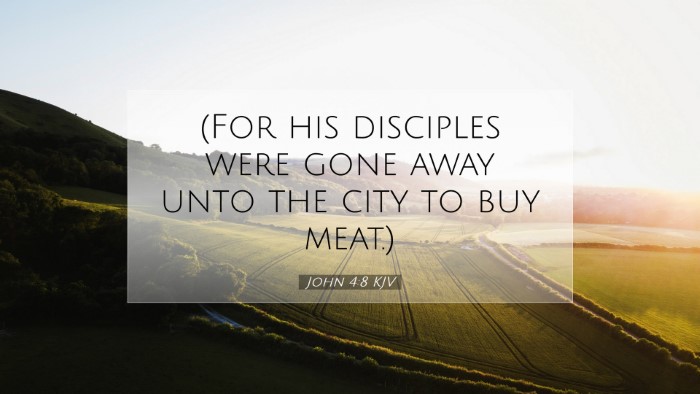Commentary on John 4:8
Bible Verse: "For his disciples were gone away unto the city to buy meat." (John 4:8, KJV)
Introduction
The brief yet profound statement in John 4:8 serves as a pivotal moment in the narrative of Jesus' encounter with the Samaritan woman at the well. This verse highlights the absence of the disciples, setting the stage for one of the most significant dialogues in the New Testament. By analyzing this verse through the lens of public domain commentaries, we can uncover the theological richness and practical implications embedded within this text.
Contextual Analysis
Albert Barnes emphasizes the setting of this encounter, noting the geographical and cultural significance of Samaria. The Jews typically avoided traveling through Samaria due to longstanding hostilities, yet Jesus intentionally chose this path. This act of crossing cultural and ethnic boundaries is a profound testament to the inclusivity of Christ's mission.
The Absence of the Disciples
Matthew Henry remarks on the disciples' absence as crucial for understanding the narrative's progression. Their departure to buy food signifies not merely a physical absence but also a spiritual and emotional distancing from the mission Jesus is about to engage in. Their focus on mundane needs contrasts sharply with the spiritual conversation that Jesus is initiating with the woman at the well.
Theological Insights
This passage speaks volumes about the nature of divine encounters. Adam Clarke underscores that Jesus, even in the absence of His disciples, remains committed to His ministry of reconciliation. The engagement with the Samaritan woman underscores His role as the Savior of all humanity, breaking societal norms and addressing spiritual thirst.
- Divine Mission: Jesus' conversation with the Samaritan woman is a deliberate act of reaching out to those marginalized by society. It challenges the exclusive notions held by the Jews regarding salvation and God's chosen people.
- The Humanity of Christ: The physical absence of the disciples also highlights Jesus' humanity. He experiences thirst and need, yet uses these moments to reveal deeper spiritual truths.
- Cultural Breakdown: By engaging with a Samaritan woman, Jesus demonstrates the breaking down of cultural barriers and gender norms, illustrating that the gospel is for all.
Practical Applications
For pastors, students, and theologians, John 4:8 serves as a reminder of the importance of prioritizing spiritual needs over worldly distractions. The disciples were focused on buying food, yet Jesus was focused on fulfilling God's plan for salvation. This dichotomy encourages a reassessment of our own priorities in ministry and daily life.
Engaging with the Marginalized
Reflecting on the implications of this verse calls for an examination of how we engage with those on the fringes of society. Just as Jesus went out of His way to meet the Samaritan woman, we are urged to seek out opportunities for ministry among those who are often overlooked or marginalized.
Embracing Divine Appointments
Furthermore, the absence of the disciples might symbolize the need for solitude in order to hear God’s voice. In our fast-paced lives, allowing for moments of silence can lead to divine appointments, where we can share the love of Christ in unexpected ways.
Conclusion
In sum, John 4:8 is not merely a transitional verse but a profound statement about the nature of Jesus’ mission and the hearts of His followers. The themes of divine purpose, cultural inclusivity, and the priority of spiritual engagement resonate deeply and challenge us today. As we meditate on this verse, may we be inspired to reflect Christ’s love and inclusivity in all aspects of our lives and ministries.


